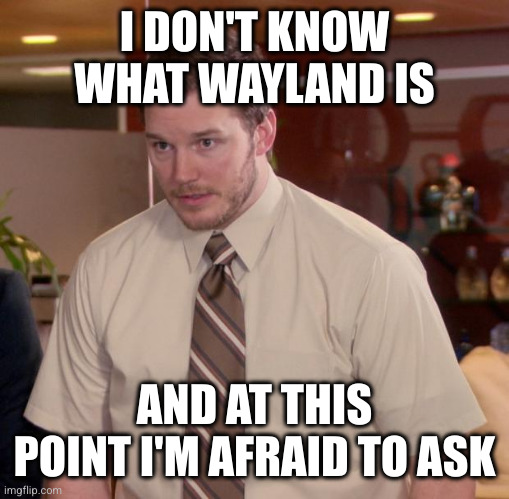this post was submitted on 29 Apr 2024
474 points (96.1% liked)
linuxmemes
27590 readers
1904 users here now
Hint: :q!
Sister communities:
Community rules (click to expand)
1. Follow the site-wide rules
- Instance-wide TOS: https://legal.lemmy.world/tos/
- Lemmy code of conduct: https://join-lemmy.org/docs/code_of_conduct.html
2. Be civil
- Understand the difference between a joke and an insult.
- Do not harrass or attack users for any reason. This includes using blanket terms, like "every user of thing".
- Don't get baited into back-and-forth insults. We are not animals.
- Leave remarks of "peasantry" to the PCMR community. If you dislike an OS/service/application, attack the thing you dislike, not the individuals who use it. Some people may not have a choice.
- Bigotry will not be tolerated.
3. Post Linux-related content
- Including Unix and BSD.
- Non-Linux content is acceptable as long as it makes a reference to Linux. For example, the poorly made mockery of
sudoin Windows. - No porn, no politics, no trolling or ragebaiting.
4. No recent reposts
- Everybody uses Arch btw, can't quit Vim, <loves/tolerates/hates> systemd, and wants to interject for a moment. You can stop now.
5. 🇬🇧 Language/язык/Sprache
- This is primarily an English-speaking community. 🇬🇧🇦🇺🇺🇸
- Comments written in other languages are allowed.
- The substance of a post should be comprehensible for people who only speak English.
- Titles and post bodies written in other languages will be allowed, but only as long as the above rule is observed.
6. (NEW!) Regarding public figures
We all have our opinions, and certain public figures can be divisive. Keep in mind that this is a community for memes and light-hearted fun, not for airing grievances or leveling accusations. - Keep discussions polite and free of disparagement.
- We are never in possession of all of the facts. Defamatory comments will not be tolerated.
- Discussions that get too heated will be locked and offending comments removed.
Please report posts and comments that break these rules!
Important: never execute code or follow advice that you don't understand or can't verify, especially here. The word of the day is credibility. This is a meme community -- even the most helpful comments might just be shitposts that can damage your system. Be aware, be smart, don't remove France.
founded 2 years ago
MODERATORS
you are viewing a single comment's thread
view the rest of the comments
view the rest of the comments

The part about negotiation is a bit off-track.
On one end, in the kernel, there's a big array of pixels that is a picture that gets drawn on your monitor (or monitors). On the other end are a bunch of programs that want to draw stuff, like pictures of your friends and web pages. In between is software that decides how the stuff the softwares want to draw get put into the pixel array. This is Wayland; it was written to replace Xorg, which is what did that job for decades prior to Wayland.
If you understand the concepts of Xorg and window managers, Wayland + a compositor = Xorg + a window manager. Wayland abdicated a lot of work to the compositors, making it simpler and easier to maintain (and compositors more complex and harder). But together, they all do basically the same job. If one of the compositors implemented a network protocol, then you could declare equivalency.
Display Server + Compositor + Window Manager = Wayland Compositor = Implementation of Wayland Protocol
Display Server = Xorg = X11 Implementation
Xorg + Separate Compositor + Separate Window Manger = the X11 equivalent of a Wayland Compositor